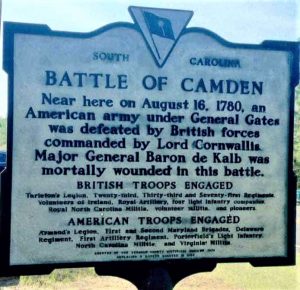By Barry Waugh - Posted at Presbyterians of the Past:
Chaplain Armstrong made his way to North Carolina with the Second Maryland marching nearly 500 miles from Philadelphia to camp at Wilcox’s Ironworks just south of what is currently Siler City. He wrote William Churchill Houston, July 8, 1780, relating the complaints of his portable parish concerning the pittance of meat and a shortage of horses. A month later the food situation worsened as the troops camped at the ferry landing beside the Peedee River just east of the current town of Ansonville. The men had two days beef to stretch into seven days protein and no meal nor flour. Armstrong observed that their diet dwindled to just apples. He commented “it is impossible for human nature to have subsisted so long as I have known it to upon green fruit.” Despite Armstrong’s assessment that “everything discouraging dwells around our little army,” he was nevertheless optimistic, “We have not much, I believe, to fear from the enemy, but troops must be more or less than men who can long endure what we now suffer.” He was incorrect about not fearing the enemy because when Armstrong and his associates went into South Carolina it turned out some fear was warranted. On August 16, 1780 roughly 3,000 soldiers including the Second Maryland and Chaplain Armstrong under Continental commander Gen. Horatio Gates were defeated by the British in the Battle of Camden. Historians have attributed the defeat to Gates’s poor strategy and failure to heed the advice of the previous commander, Gen. Baron Johann de Kalb (killed at Camden). This humiliating rout was added to the devastating captures of the port cities of Savannah in the fall, then Charleston in May. John Hall’s account (see Notes) has no correspondence from Armstrong regarding Camden, whether this is because Armstrong did not write to Houston, or because Hall chose not to include an account of the costly defeat is not noted. However, the American forces would rebound to turn the Revolution in the South towards the ultimate success Armstrong anticipated with victories at King’s Mountain in October and Cowpens in January 1781.Read more...
